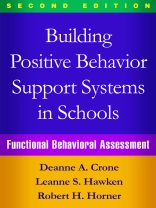A widely used practitioner guide and text, this book presents a blueprint for meeting the challenges of severe problem behavior in grades Pre K-8. It shows how to provide effective behavior support for the 1-5% of students who require intensive, individualized intervention. Case examples illustrate step-by-step procedures for identifying student needs using functional behavioral assessment (FBA) and designing, implementing, and evaluating team-based behavior support plans (BSPs). The book also describes how to build school- and districtwide capacity to conduct FBA-BSPs. Reproducible forms and worksheets are included; purchasers get access to a Web page where they can download and print the reproducible materials in a convenient 8 1/2′ x 11′ size. New to This Edition: *Incorporates current FBA-BSP research and best practices. *Chapters on developing districtwide capacity; FBA apps and software; applications for academic problems; and early childhood settings. *Increased attention to FBA-BSP as a Tier III intervention within a multi-tiered framework. See also the authors’ less intensive intervention for moderate problem behavior: Responding to Problem Behavior in Schools, Second Edition: The Behavior Education Program. Also available: Dr. Hawken’s training DVD, The Behavior Education Program: A Check-In, Check-Out Intervention for Students at Risk, which demonstrates the BEP in action.
Jadual kandungan
I. Using Functional Behavioral Assessment in Schools: Context and Framework 1. Functional Behavioral Assessment in Schools: Historical Background and the Current Context, Robert E. O’Neill & Kaitlin Bundock 2. Functional Behavioral Assessment in Schools: Thinking Functionally across All Tiers of Behavior Support II. Embedding Functional Behavioral Assessment within School Systems: Case Examples 3. Conducting a Functional Behavioral Assessment 4. Designing a Behavior Support Plan 5. Evaluating and Modifying the Behavior Support Plan III. Using Functional Behavioral Assessment within School Systems: Building School-Based and District-Based Capacity 6. Who Will Be Involved in the Behavior Support Team and How Do You Get the Behavior Support Team to Work Together as a Team? 7. How Do You Generate within-Building Capacity for Functional Behavior Assessment on the Behavior Support Team? 8. Improving District Capacity to Deliver Basic FBA-BSP Support, M. Kathleen Strickland-Cohen, Sheldon L. Loman, & Robert H. Horner IV. Functional Behavioral Assessment as Applied to Specific Problems or Specific Populations 9. Functional Behavioral Assessment for Academic Concerns, Courtenay A. Barrett & Donna M. Gilbertson 10. Functional Behavioral Assessment with Preschool-Age Children 11. Technology Trends in Functional Behavioral Assessment and Intervention, J. Matt Jameson, Allison L. Bruhn, & Leanne S. Hawken Appendix A Request for Assistance Form Appendix B Functional Behavioral Assessment–Behavior Support Plan Protocol (F-BSP Protocol) Appendix C Functional Assessment Checklist for Teachers and Staff (FACTS) Appendix D Student-Guided Functional Assessment Interview (Primary) Appendix E Assessing Activity Routines Form Appendix F Brief Functional Assessment Interview Form Appendix G Functional Assessment Observation Form Appendix H A Checklist for Assessing the Quality of Behavior Support Planning: Does the Plan (or Planning Process) Have These Features?
Mengenai Pengarang
Deanne A. Crone, Ph D, is Research Associate at the Center on Teaching and Learning at the University of Oregon. She has directed several research and training grants that address behavior disorders, positive behavior support, and functional behavioral assessment. Dr. Crone has presented her work on function-based support locally, regionally, and nationally, and has conducted workshops with a variety of professionals, including school psychologists, administrators, teachers, and paraprofessionals. With Leanne S. Hawken and Robert H. Horner, she is coauthor of Responding to Problem Behavior in Schools, Second Edition. Leanne S. Hawken, Ph D, BCBA, is Professor in the Department of Special Education at the University of Utah. She is a recipient of the College of Education Research Award from the University of Utah. Her research focuses on positive behavior support, including schoolwide behavior support, targeted interventions for students at risk, and functional assessment/behavior support planning for students engaging in severe problem behavior. She frequently leads presentations and workshops on Check-In, Check-Out and positive behavior interventions and supports. In addition to over 20 book chapters and journal articles, she is coauthor of Building Positive Behavior Support Systems in Schools, Second Edition; Responding to Problem Behavior in Schools, Second Edition; and the training DVD Check-In, Check-Out, Second Edition: A Tier 2 Intervention for Students at Risk. Robert H. Horner, Ph D, is Professor of Special Education at the University of Oregon and Director of Educational Community Supports, a research unit within the College of Education that develops and implements practices resulting in positive, durable, and scientifically validated change in the lives of individuals with disabilities and their families. Dr. Horner’s 35-year history of research has focused on applied behavior analysis, stimulus control, instructional technology, positive behavior support, and large-scale system change.












